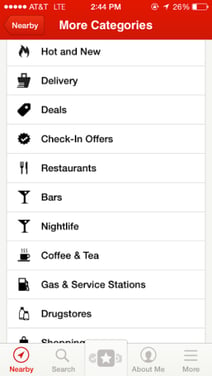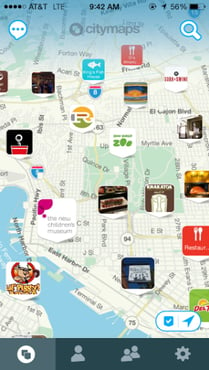Checking In To Location-Based Apps

By Allison Howen, Associate Editor
Before the days of smartphones and tablets, people planned out every last detail of their trips - whether long or short.
After all, no one wanted to stop at the nearest gas station for directions or take a gamble on the local diner's meatloaf. In 2014, however, it isn't necessary to plan ahead nearly as much - and technology is to thank.
In fact, Pew Research reveals that 74 percent of adult smartphone owners use their mobile devices to get directions or other information, like business reviews, based on their current locations. In addition to the search bar, many consumers are leveraging mobile applications to learn more about their surrounding areas.
Location-based mobile apps empower users to discover nearby businesses and relevant/important information about them including descriptions, hours of operation and contact details. The challenge for merchants is knowing which apps consumers are using and then establishing a presence on these apps to drive foot traffic to their brick-and-mortar locations. Although there are many of these applications available for download (for a list, go to wsm.co/checkinlist), merchants should consider focusing on these three robust solutions.
Trending: Yelp
Yelp is one of the most downloaded location-based apps, and businesses who aren't managing their presence on this platform are definitely at a disadvantage. In fact, approximately 61 million unique visitors accessed Yelp via their mobile devices on a monthly basis during Q1 2014.
What About Google?
Visit the feature to learn why a presence on all-things Google is necessary for local businesses.
From the Yelp app, consumers can find and check in to a variety of local businesses, leave written and video reviews and upload photos from their experiences. Merchants must do their parts by claiming their listings on Yelp.com in order to optimize it with data like descriptions, hours and contact information. Plus, business owners can add photos, track user views with Yelp analytics and reply to customer reviews both privately and publicly.
To increase the chances of conversion, merchants can leverage Yelp's advertising, deal and check-in features. Advertising on the Yelp platform, for instance, enables merchants to place their business listings atop relevant and local search results on both desktop and mobile devices. Conversely, merchants can create a "deal" or "check-in offer" to entice customers to visit their brick-and-mortar businesses. Both of these features are discoverable from the mobile app, allowing consumers to search specifically for nearby locations with deals or special check-in offers (see image A).

Image A The searchable "category" menu within Yelp's iOS app. App to Watch: Foursquare
Although a pioneer in the location-based mobile app space, Foursquare isn't as popular as it once was. This likely sparked the company's recent gamble to split its business into two separate mobile apps with different functions. The previous Foursquare app will concentrate on business discovery, while the new app, called Swarm, aims to connect users within local areas.
It is still uncertain how this new business model will perform since the revamped Foursquare app won't be released until later this summer. That said, Foursquare noted that its overhauled app will feature an updated discovery feature, include more personalized search and offer new ways to recognize and reward users.
Regardless of how these changes are embraced, Foursquare has more than 50 million members and 1.7 million companies listed, which means merchants should definitely have this app on their radar. Currently Foursquare offers a mobile app for businesses that enables users to manage their listings while on the go, but the simplest way to optimize a listing is on business.foursquare.com. From this site, merchants can claim their venues, post business updates, reward customers, advertise and monitor analytics.
Up-and-Coming: Citymaps
Citymaps is quickly carving out a space for itself in the location-based app market. The app essentially offers a "social map" that enables users to explore their local areas, create personalized maps and share maps with friends. Plus, users have the ability to collaborate with friends to create group maps. Although currently only available for iPhone, an Android app is expected to roll out eventually.
According to the company, Citymaps covers 15 million locations throughout the United States and is working to expand across the globe. Each business is represented on the map with a logo (see image B) to make it easy for users to find nearby places. Moreover, the app offers turn-by-turn directions, store finders, menus and user comments on location listings.

It is important to note that Citymaps is still growing, which means that consumer engagement with the app varies. Merchants that want to ensure their businesses can be found can email the company to add or edit their listings, or can submit their businesses through the settings tab on the mobile app. However, merchants should keep in mind that Citymaps currently doesn't offer business engagement tools or advertising options like Yelp and Foursquare, which might actually make it more appealing to some.
Don't Check Out
Once a presence is established on location-based apps, it is important for merchants to maintain their listings. It's always a good idea to add fresh content, even if it is just updated photos. In doing so, merchants will strengthen their mobile strategies and attract more local customers in the process.

Subscribe to Our Newsletter!
Latest in Software








